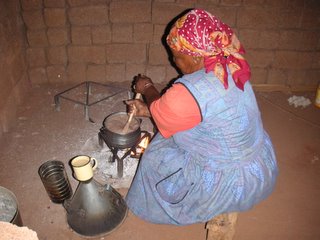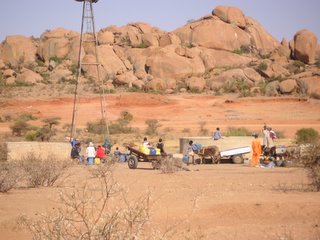Pictures
Here are pictures that I took during training and in October. . . Sorry that they're not in order, but I've put a date on the bottom of each of them.
 Mma sometimes cooks bogobe outside over the fire. Stirring hardening bogobe requires amazing strength! 10/28/2005
Mma sometimes cooks bogobe outside over the fire. Stirring hardening bogobe requires amazing strength! 10/28/2005 Here are my Baba and Mma in front of my house. They just finished eating bogobe and chicken feet. Notice the burglar bars on the my window. The Peace Corps requires burglar bars for any of the windows to a volunteer's room. They also stated that we shouldn't keep anything in our windows that marks the room as ours. But, my room is the only one in the house with burglar bars. . . marking it for the world to see! 10/21/2005.
Here are my Baba and Mma in front of my house. They just finished eating bogobe and chicken feet. Notice the burglar bars on the my window. The Peace Corps requires burglar bars for any of the windows to a volunteer's room. They also stated that we shouldn't keep anything in our windows that marks the room as ours. But, my room is the only one in the house with burglar bars. . . marking it for the world to see! 10/21/2005. Here is Pitsi, Kgaugalo, Kwena, and I. They were my host sisters in Moletji. They are fantastic! 10/10/2005
Here is Pitsi, Kgaugalo, Kwena, and I. They were my host sisters in Moletji. They are fantastic! 10/10/2005 Most of the families in Moletji have water faucets outside of their homes which they pay for the water to come into. The families that don't go here. Notice the donkey carts for carting the water back to their homes. 10/9/2005
Most of the families in Moletji have water faucets outside of their homes which they pay for the water to come into. The families that don't go here. Notice the donkey carts for carting the water back to their homes. 10/9/2005 There was a fairwell ceremony for us in Moletji and there was groups of girls performing traditional Sepedi dances. At the beginning of the ceremony, the girls formed lines and danced closer to the enterance. 10/8/2005
There was a fairwell ceremony for us in Moletji and there was groups of girls performing traditional Sepedi dances. At the beginning of the ceremony, the girls formed lines and danced closer to the enterance. 10/8/2005 Then they would dance and sing in a circle. . . 10/8/2005
Then they would dance and sing in a circle. . . 10/8/2005 With gogos (grandmothers) playing drums in the middle. 10/8/2005
With gogos (grandmothers) playing drums in the middle. 10/8/2005 Green! Blending in with everyone else! There's no way that I'm in Africa. . . Park in Frankfurt, I spent several hours here reading. 9/28/2005
Green! Blending in with everyone else! There's no way that I'm in Africa. . . Park in Frankfurt, I spent several hours here reading. 9/28/2005 Frankfurt skyline 9/28/2005
Frankfurt skyline 9/28/2005 While on my site visit, I went to a choir competition with my Mma. Here she is waiting for the taxi with her friends. 9/10/2005
While on my site visit, I went to a choir competition with my Mma. Here she is waiting for the taxi with her friends. 9/10/2005
Morning assembly at Tshukudu primary! There are 1013 learners and 26 teachers at this school. Morning assembly consists of a couple songs, announcements, and the lord's prayer. There are five buildings like the two that you can see each holding four classrooms. 9/9/2005